Two refrigerators walk into a bar…
Two refrigerators walk into a fully automated department store to fill themselves up. They share a flying car on their way home, exchanging recipes en route. One of them drops by for scheduled maintenance.

$5,000 Samsung IoT Refrigerator - Hi-res gorilla glass display. Functions include: ordering groceries, taking selfies and sending it to your phone so that you know the contents all the time
For a while it seemed like Back to the Future’s predictions would be laughably off. Then recently, in what I’d like to believe was life imitating art, a whole slew of inventions came to market. Like Self-tying shoes, Hoverboard, Tablet, Motion Controlled Video Games to mention a few.
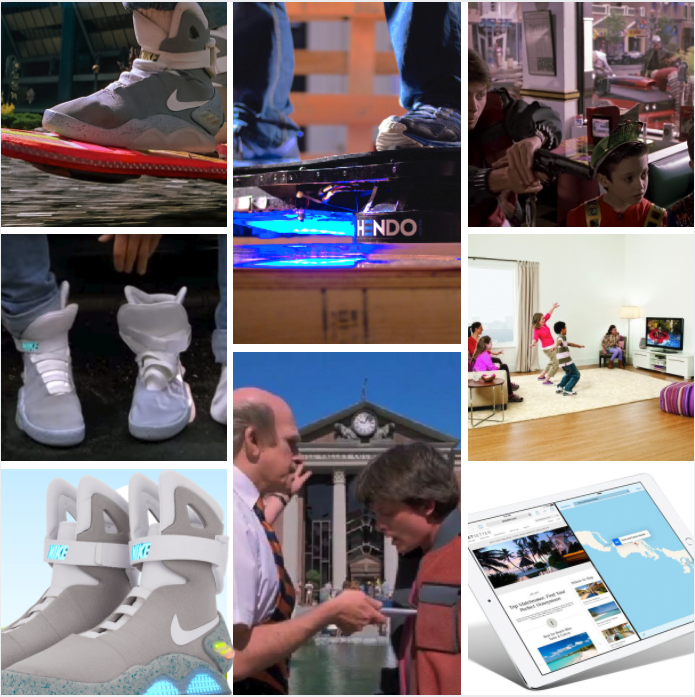
It's difficult to imagine today that smartphones and tablets used to be Sci-fi - just as the movie suggests. It was even harder to envision an actual working self-tying shoe or hoverboard back then... and presto - welcome to the future!
With those new technologies, the refrigerator scenario came a great deal closer. Of course, it won’t run exactly like that. The refrigerator probably won’t move. Instead, it’ll be served by an army of drone minions whizzing around the place. But those are details. They don’t take away from the overall picture.
A Brave New World(?)
A powerful cocktail of IoT (Internet of Things), AI (Artificial Intelligence), VR/AR (Virtual Reality/Augmented Reality) and related technologies are taking the world by storm. Electric cars, flying cars, smart homes, holograms, computers playing Jeopardy or diagnosing cancer. You name it. We’re seeing it.
Smart Homes and Smart Hoes
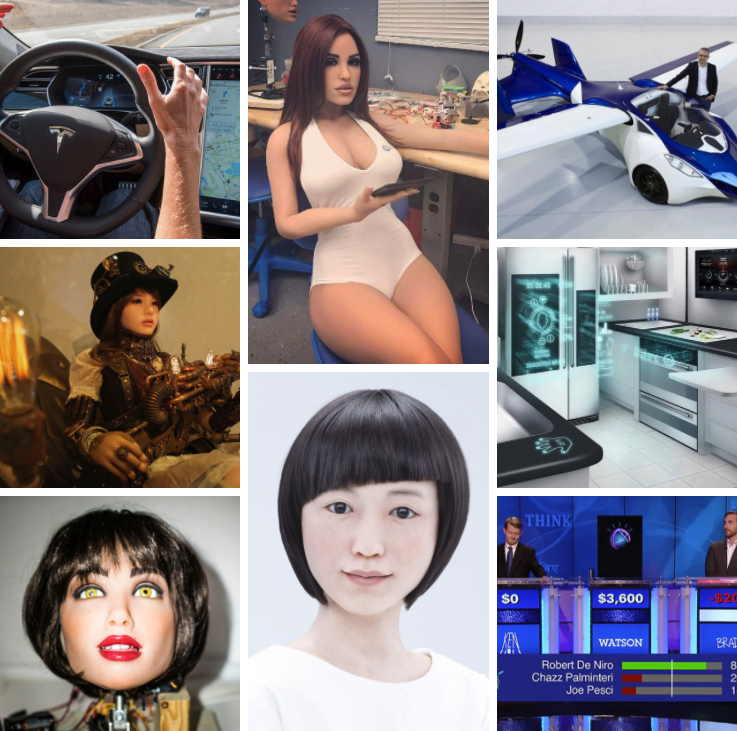
In case you are wondering, the only live persons appear in the last column; thus, all the 'ladies' are high-quality robots. Also featuring the self-driving car, flying car, smart home and IBM Watson - the machine that beat the crap out of all-time Jeopardy champions
These innovations aren’t just making our lives better; they’re also causing massive disruption. Leading prominent personalities, like Tim Berners Lee (The inventor of WWW), Mark Zuckerberg (Facebook) or Elon Musk (Tesla, SpaceX, Neuralink) and others advocate universal basic income. The reason? They believe we need to counter the disruption of people losing their job to robots on a massive scale. (and implicitly: who will buy the stuff produced by those robots, right?!).
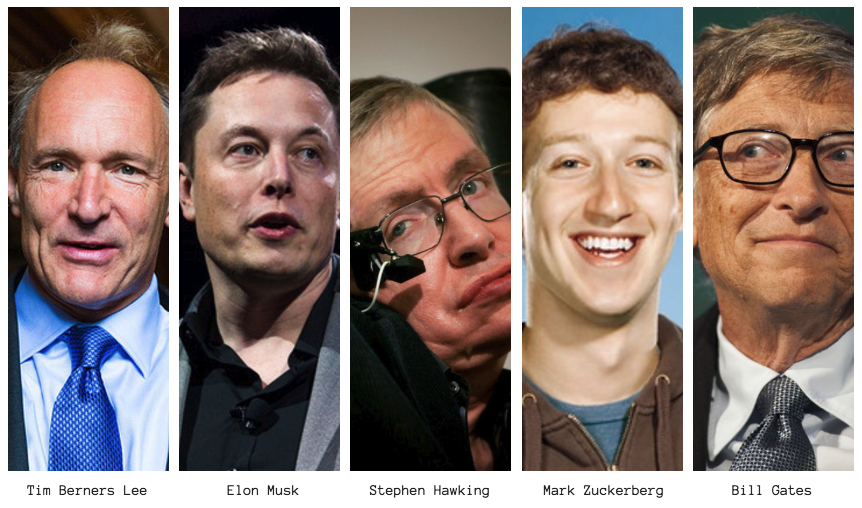
Some of the biggest tech influencers of our age - Tim Berners Lee, Mark Zuckerberg, Elon Musk, Stephen Hawking, Bill Gates. While they sometimes have very opposing views on how (and if) the robot takeover will play out, they all agree that the impact of machines will be deep and profound
Taxing robots is another real, ongoing conversation started by Bill Gates (Microsoft).
Stephen Hawking (the famous astrophysicist) thinks Robots aren’t just taking out jobs, they’re making society more unequal.
These aren’t excerpts from an Asimov novel. Instead, they’re actual concerns expressed by some of this generation’s greatest thinkers.
Déjà vu
It’s not the first time that people have sounded the alarm on progress. A lot of people were equally worried about the industrial revolution. Some craftsmen, the Luddites, were so concerned they started smashing machines with sledgehammers.

It's draining to keep up with all the technological changes happening faster than ever - coping with the fact that any technology can become obsolete overnight in a matter of years is a challenge facing our generation
Now, from where we’re standing, it’s easy to scoff at these people. Couldn’t they see one of the greatest surges of economic progress the world had ever known was ahead of them? How could they ever stand in the way?
The thing is, from where they were standing, it didn’t look like that at all!
The industrial revolution started around 1760. Even by the most optimistic measures, significant wage growth for the working class didn’t start until the 1820s. That’s 60 years of disruption, without any serious gain. No wonder they were unhappy! If that was happening to me, I might join them with my shovel! (Don’t have a hammer).
Another time people worried about the impact of progress was during the Great Horse Manure Crisis of 1894. The population of London had been growing and growing. As there wasn’t any other viable transportation, the horse population had grown right along with it.
The Times newspaper predicted that “In 50 years, every street in London will be buried under nine feet of manure.” (as a result of 50,000 horses producing over a TON of horse dung DAILY. New York had 100,000 horses - go figure).
How did they solve the situation? Well, they couldn’t and didn’t!
Instead, it was solved by an American gentleman called Henry Ford and his Model-T car. This car dropped the price of the automobile to where it was within reach of ordinary citizens. This meant people bought more cars than horses, which inadvertently got rid of horse dung. However, his production line only took off in 1908, so they had to deal with 15 more years of horseshit.

Welcome to Horseville!
For me, these stories offer two powerful lessons.
- The Great Horse Manure Crisis points out how technology can offer a way out of seemingly unsolvable problems - though not always how you imagined.
- The Luddite story shows us that disruption caused by technology can be intimidating. And rightly so.
It gets even worse
More than 4000 years elapsed between the invention of writing and the printing press. From the printing press to the typewriter took a little over 400. From there to the computer was 80 years. The internet wasn’t far behind, and smartphones were right on its heels.
In other words, technology is accelerating. It is feeding on itself. Of course, this is nothing new. Moore’s law, which was originally only for microchips, has been broadened to every field of human endeavor. The reason? Computer processing power can be used almost everywhere.
This is leading to exponential, or - if you prefer something more picturesque - ‘hockey stick growth.’
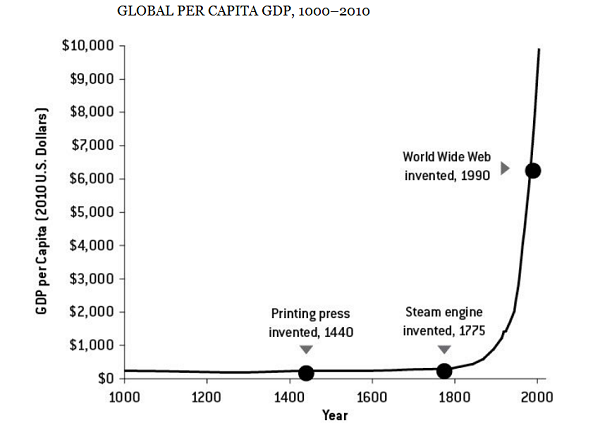
Hockey stick growth - once the supergrowth starts, it makes previous progress seem non-existent. The discovery of printing press and steam engine were also disruptive technologies in their time. Relative to today's growth (happening due to the personal computer, Internet, smartphones, the cloud, AI etc.) it seems like nothing ever happened
The result? We barely have time to recover from one upheaval before the next one hits.
Attack of the Clones
I remember reading My Job Went to India by Chad Fowler about 15 years ago. In it, he made all kinds of recommendations to prepare software engineers for the globalizing job market. The big danger he talked about was foreign workers capable of doing the same task for a lot less.
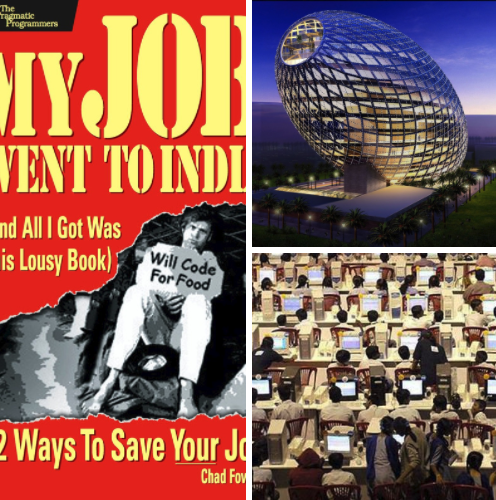
India is home to a vast number of skilled, highly educated professionals in various industries, working for a fraction of the cost compared to their colleagues in the western world
Today that’s a problem we’d like to have: jobs don’t go to India anymore. Instead, they go up in a cloud of digitized smoke.
And while Chad Fowler had some great ideas for dealing with other human beings, that won’t help much when you’re competing with AIs. More worryingly, whatever solutions you come up with today will be deprecated tomorrow.
There’s a better way to go about it: Don’t fight the AI in the first place!
That’s like trying to keep back the waves with your arms. Instead, learn to surf.
Take those Luddites from before as an example. Their efforts didn’t slow down the progress of technology. Instead, they were just barrelled over and left in the dust. Their salaries didn’t grow.
For one group, wages did shoot upwards during this time. Who were they? The people who owned the machines. That’s happening again today, as Stephen Hawking argued.
So stop fighting the waves. Turn around and ride the digital revolution.
How to Own the Modern Day Machines
If you think like a businessman of the industrial era, you’re not taking advantage of one of the fundamental differences between the industrial revolution and the current one: you don’t need to own a factory anymore to get started.

In the modern days, everyone can have their share of the processing power of the giants, like Amazon, Microsoft or Google
Cloud computing is the AirBnB of software execution - instead of owning a server farm, or even a machine, you can hire a little (or huge) ‘slice’ of the cloud. Thus, executing computing tasks that took a large upfront investment in the past are easier and cheaper than ever.
However, that’s only the first half of the equation. You need to learn the language and culture of the machines by understanding:
- Coding: for effective communication
- AI: to leverage their intelligence
- Data Science: to make sense of vast amount of data generated in the process
The goal of this series, the whole website, and the course I am building is to teach that to you. It doesn’t matter how inexperienced you are - I’m assuming no prior experience with programming at all!
We’re going to look into practical applications of AI/Data Science. I believe it will be far more useful than your average airy-fairy article that sensationalizes every new algorithm as if it’s an AI and every gadget with a chip in it as part of IoT.
What’s more, we’ll explore the current trends governing the job market and how to get involved. Yes, even if you’re getting started. In that way, we can get you to work as soon as possible.
Stay tuned - see you in the next installment!